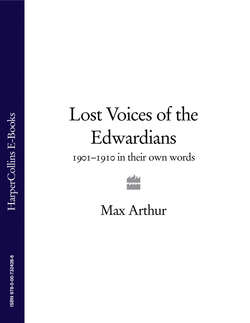Читать книгу Lost Voices of the Edwardians: 1901–1910 in Their Own Words - Max Arthur, Max Arthur - Страница 4
INTRODUCTION
ОглавлениеIn a world of high-speed travel and communications, advanced medical science and multi-media entertainment at the touch of a button, it is hard to conceive of a life where it was not unusual for country dwellers to pass a whole lifetime without leaving their native county. A great gulf separated the rich and the poor. For the wealthy, it was a life of comfort, with every whim attended to, while the poorest suffered almost unimaginable deprivation.
At the start of the twentieth century, life moved at a slower pace – the rich had carriages or, increasingly, cars. The poor went on foot, walking miles to work before a day in the factory, the mine, the mill or in the fields. The picture was the same throughout the country.
For country people the big excitement was the arrival of a travelling fair, or the annual one-day holiday for the works outing – perhaps to the seaside. In cities there were the raucous music halls, while the earliest cinemas were showing glamorous silent films. With no television, radio or recorded music, people were forced to make more of their own entertainment. The changing seasons brought traditional festivals and celebrations, while children displayed extraordinary ingenuity with their playground games.
Work – or the lack of it – was a key factor in the family's survival, and an industrial illness or injury to the breadwinner could be devastating. Children officially left school at the age of fourteen – often after a spell of working split days where they went to school in the morning and to work in the afternoon – but in big families, the oldest child would often have to start work even younger to support the growing numbers. For those with no family and no work, the spectre of the workhouse still loomed.
Working-class communities were close-knit – tenement dwellers in the cities and rural villagers alike – and in times of adversity or illness, neighbours rallied around. Where a doctor or midwife cost money that the family could ill afford, it was not unusual for a local woman to deliver babies, sit with the dying and lay out the bodies – often for no payment.
It has been my pleasure to meet a number of men and women who were born before and during the Edwardian period, the oldest being Henry Allingham, who is now 109. Their stories, along with those of many other ordinary people that have been recorded over the last forty years by a range of voluntary groups, archives and institutions, create a unique glimpse into an age which is now almost entirely beyond our reach. The length of the accounts I have chosen vary, some take many pages, whereas others simply select the most affecting moments. Most contributors appear only once, while others you will see several times. It has been a privilege to listen to the voices of these men and women, many now long dead, and to bring together their vivid memories. These are their words – I have been but a catalyst.
Max Arthur
London
January 2006
